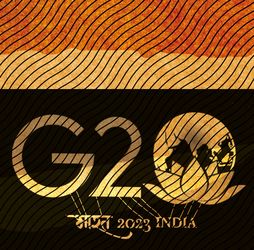G20 countries account for 85 per cent of global GDP and 60 per cent of world population. Their decisions affect each and every individual in the world. The G20 plays an important role in shaping and strengthening global architecture and governance on all major international economic issues.
The policies drafted by G20 leadership have direct implications for developing countries, particularly low-income countries. It helps them implement nationally driven policies and priorities necessary to meet internationally agreed upon development goals. Economic disruptions have marked the post-pandemic era. Covid-19 is said to be the biggest disruption in the world order today, though there are conflicts taking place in many parts of the world.
But, was this the first pandemic? No. Will it be the last? No. Are these wars and conflicts first in the world? No. Will they be the last? No. The world will face such challenges in future as well. So the focus should be on the challenges humanity is facing right now, and is bound to face in the future.
Multilateral institutions were created to avert such conflicts and in case aversion wasn’t possible then in those cases to find peaceful methods to solve those conflicts through effective arbitration. The set objectives have so far have not been achieved, thus we need reformed multilateralism.
With its rich civilisation dating back thousands of years, India understands that disruptions are very much a part of human existence. India brings a historical perspective to the table. The world needs ancient Indian philosophies like ekatma manavvad, and, antyodaya.
Ekatma manavvad, or integral humanism, means that no one person, no one country, no one society can live by itself. A country cannot live in isolation and a conflict in one part of the world affects all parts of the world in some manner or the other.
Antyodaya means working for the last person in the last row. It essentially means that another person’s pain is our pain. And that it is our duty to become a voice for the voiceless.
Our forefathers enunciated these ideologies thousands of years ago, and India today believes in these principles; our foreign policy is clear—to respect everyone and to aim for global peace.
Thanks to these policies and philosophies, India’s position is that of a bridge between the Global North (the western world) and the Global South (Asia, Africa, Latin America and Oceania).
Culturally, India is a country of the east, but if we look at the principles that we follow—be it democracy, open society, freedom of the media—we are very much a country of the west.
India is physically, symbolically and metaphorically placed to act as a bridge for all uncertainties. And that is the role of India in the G20 presidency. Our civilisational value system and cultural philosophies act as a guiding force.
There are two things India is trying to aim during the presidency. One, to become a voice for the voiceless, that is the Global South, and two, to find the resilience to deal with plural challenges. I am positive that we will succeed in being the bridge between the Global North and the Global South, and draw the two sides closer.
Lekhi is Union minister of state for external affairs and culture.


